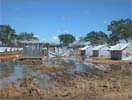
A new chapter began in Sri Lanka over the weekend, when the last of the Tamil Tigers laid down their arms and publicly recognized that Vellupillai Prabhakaran, the Tiger’s longtime leader, had been killed by the Sri Lankan army. The war between the government and the Tigers has ended but the world must now examine the cost of the offensive, which ruthlessly pitted the Tigers against government forces inside a small strip of land with tens of thousands civilians caught in the crossfire. Myriad crucially important questions remain regarding the way forward in Sri Lanka and the role of international community to ensure that civilian killings and war crimes committed on both sides do not go unpunished.
Humanitarian organizations remain aghast at the treatment of Tamil civilians, who currently sit in the world’s largest IDP camps in the northeast of the country. A statement from Human Rights Watch noted:
Some 300,000 civilians displaced by the fighting remain intensely vulnerable. Government restrictions on humanitarian access to government detention camps and to the wounded who remain in the conflict area has worsened the already serious conditions.
As David White of Oxfam told the New York Times Friday, “the government is afraid that with such a large number of vehicles going into the camps, some LTTE members may escape.” Journalists remain barred from visiting the region affected by recent violence, but U.N. Secretary General Ban Ki-moon took an aerial tour of the area late last week. Commenting on his trip to CNN, Secretary Ban stated he believed that many civilians had been killed and noted, “I have traveled around the world and visited similar places, but this is by far the most appalling scene I have seen.”
The United Nations continued its examination of the situation today during a special session of the U.N. Human Rights Council in Geneva. Two competing resolutions were brought forward: one, from a group of mostly European countries, advocated an international investigation of crimes committed during the last stages of the war; the other, from Sri Lanka and a group allies including China, India, and Russia, lauded government policies and advocated for increased international aid. Navi Pillay, the United Nation’s chief human rights official, told the special session that both the government and the Tigers, “grossly disregarded the fundamental principle of the inviolability of civilians.” She noted further that an independent investigation of the crimes committed by both sides was necessary, saying, “Establishing the facts is crucial to set the record straight regarding the conduct of all parties in the conflict.”
Photo: IDP camp at Manic farm, Vavuniya. Courtesy of Human Rights Watch

